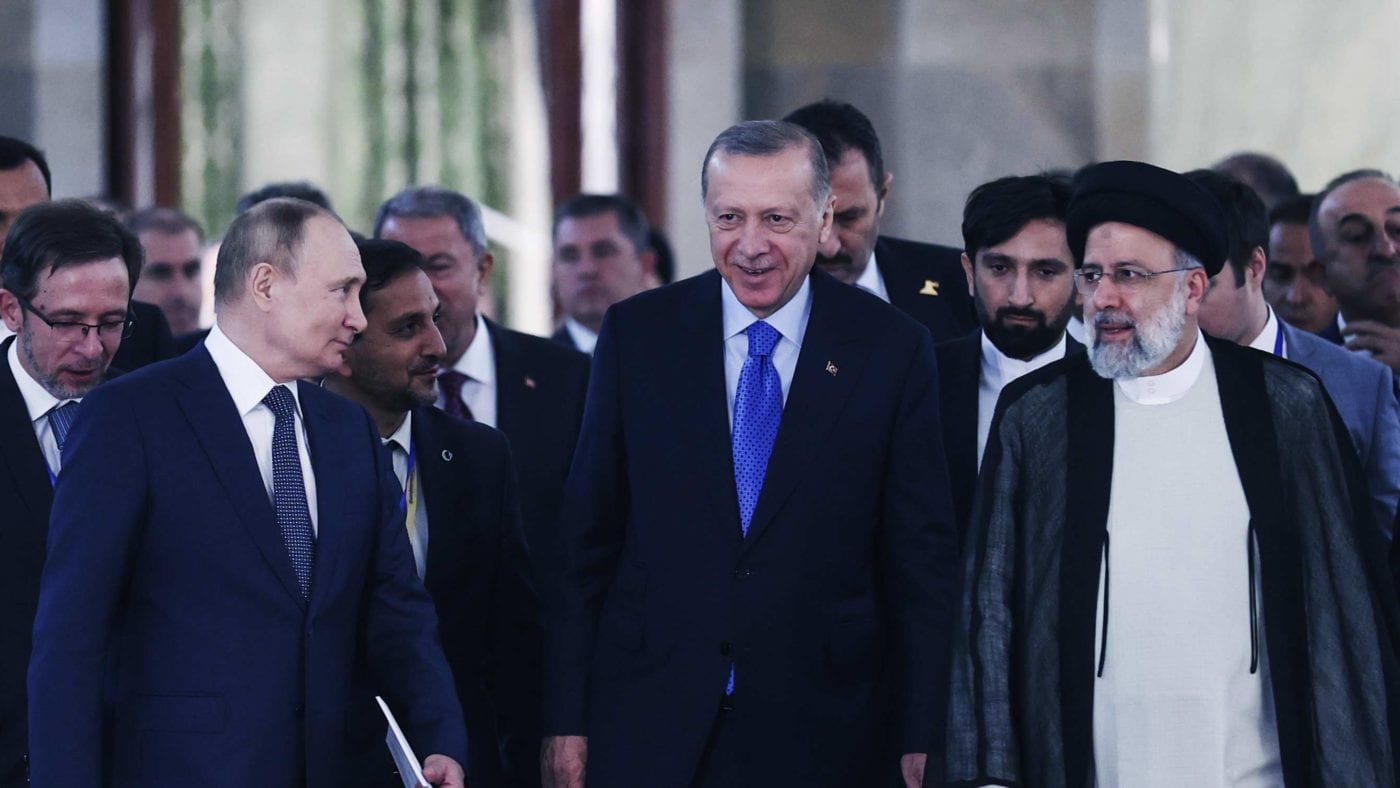Ukrainian food exports are finally starting to arrive on foreign shores after a deal struck between Vladimir Putin and Turkish president Recep Tayyip Erdogan in the living room of the Iranian leader, Ayatollah Ali Khamenei. After a five-month naval blockade, ships have been allowed to leave Ukraine’s Black Sea ports and continue through the Turkish-controlled Bosphorus. One such shipment, carrying 50,000 tonnes of cooking oil, is to arrive in India, and another carrying grain has reached Lebanon.
The deal struck between Erdogan and Putin has cemented the position of both autocrats. Erdogan is truly having his cake and eating it – he is recognised as the authority in the region, with the crucial bargaining chip of Nato article 5, while freely pursuing his own agenda in Syria against the Kurds. Turkey has also notably not cancelled orders of s-400 air defence systems from Russia.
Putin, meanwhile scored a huge propaganda win for his domestic audience – the only market he really cares about. Here was the Russian president securing an important agreement at a high-level meeting with a major world leader. The media focused on Putin’s minute-long wait for Erdogan, which was in all likelihood a finely orchestrated move to distract from the backroom deal on drones, food and power in the Middle East.
Far from a humiliating encounter, the summit in Turkey was little short of a triumph for Putin, satisfying the rest of the world’s urgent need for food exports but muffling the ramifications of the deal. And the devil really is in the detail here: for instance, Russia gets to search all ships heading to Ukraine, which means delivering weapons to the Ukrainians by sea is now out of the question. Moreover, as well as conducting the searches in international waters, the ships are also being stopped by the Russians in Ukrainian territorial waters. All of this means prolonging the war and playing into Russia’s hands.
The UN has also been dancing to Russia’s tune by including a Russian delegation in the body tasked with overseeing Ukraine’s food exports. This effectively puts any and all sea shipments under the watchful eye of the Russian military.
As well as the many practical issues with this deal, it represents a PR coup for Putin among his terror-supporting allies. Holding the talks in Iran lends a patina of legitimacy to another autocratic regime doing its utmost to undermine the West. Then there is the side deal between Tehran and the Kremlin for the transfer of Shahed 129 combat drones to Russia – that’s on top of the anti-tank and surface-to-air missiles the Iranians are already apparently supplying them. It seems the cost of cooking oil was weighed against Ukrainian lives and the fry-up won.
More to the point, this agreement does absolutely nothing to rein in Russia’s aggressive expansionism. Indeed, a backroom weapons-for-food deal simply consolidates their strategy. Nor should we forget that this food crisis is itself the direct result of Russian aggression, both in terms of blockading Ukrainian export and in the frantic rush for supplies that ensued.
But although the war has helped create a global food crisis, there has not been anything resembling a united global response. Most strikingly, the very African and Asian states that have born the brunt of the food shortage have remained criminally neutral in the face of Putin’s warmongering.
What’s needed now is a truly united front those suffering thanks to Russian neo-imperialism. Diplomatic missions need to be expelled, Russian mercenaries have to be sent packing and Russian business interests must be made to dance to the West’s tune. Deals that address immediate concerns at the cost of long-term stability will harm us and will only bequeath a more volatile, less safe world for our children.
Ultimately, the cost of doing business today is legitimacy and weapons for Putin, legitimacy for Iran, an ever-stronger Erdogan and Ukrainian lives. This deal is very far from a triumph for either Ukraine or its Western allies – it’s time to expose the agreement for the sham that it is and begin a truly global effort to stop Russia.
Click here to subscribe to our daily briefing – the best pieces from CapX and across the web.
CapX depends on the generosity of its readers. If you value what we do, please consider making a donation.


